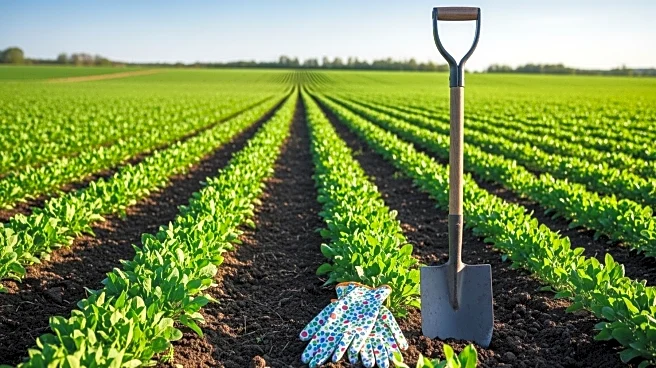What's Happening?
The World Economic Forum (WEF) is emphasizing the critical role of women in agriculture, particularly in India, where women constitute a significant portion of the agricultural workforce. Despite their growing numbers, many women remain unpaid, with nearly half of the female agricultural workers receiving no wages. This situation is exacerbated by systemic inequities, such as lack of land ownership and lower wages compared to men. The WEF highlights the potential for global trade trends and technological advancements to improve women's economic inclusion in agriculture. Initiatives like the India-U.K. Free Trade Agreement (FTA) could boost agricultural exports and provide new opportunities for women, especially if provisions for training and credit access are implemented.
Why It's Important?
The focus on women's role in agriculture is crucial as it addresses both economic and gender equity issues. Women in agriculture are often trapped in low-value tasks, and their contributions are undervalued. By recognizing and addressing these inequities, there is potential for significant economic growth and empowerment of women. The WEF's emphasis on this issue could lead to policy changes that promote women's ownership of land and access to financial resources, ultimately transforming their role from unpaid laborers to entrepreneurs. This shift could have a profound impact on the agricultural sector and the broader economy, as well as on societal norms regarding gender roles.
What's Next?
To capitalize on these opportunities, stakeholders including governments, NGOs, and the private sector must collaborate to implement targeted measures. This includes promoting digital literacy among women, ensuring access to affordable technology, and providing training programs. Successful models, such as Odisha's Swayam Sampurna FPOs and Rajasthan's Jhalawari Mahila Kisan Producer Company, demonstrate the potential for technology to enhance women's competitiveness in agriculture. Scaling these initiatives could lead to widespread economic benefits and greater gender equality in the sector.
Beyond the Headlines
The broader implications of this focus on women in agriculture include potential shifts in cultural and societal norms. As women gain more recognition and economic power, traditional gender roles may evolve, leading to greater gender equality across various sectors. Additionally, the emphasis on digital solutions highlights the importance of technology in bridging gaps and creating new opportunities for marginalized groups. This could set a precedent for other industries to follow, promoting inclusivity and innovation.









